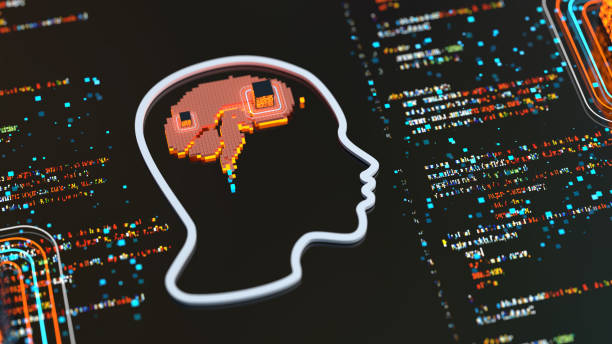What is Artificial Intelligence and What are its Applications?

Artificial Intelligence (Artificial Intelligence) is a branch of computer science that deals with creating machines capable of performing tasks that typically require human intelligence.
These tasks include learning, reasoning, problem-solving, understanding natural language, pattern recognition, and decision-making.
#Artificial_Intelligence strives to simulate human cognitive abilities in machines using algorithms and mathematical models.
The applications of Artificial Intelligence are vast and diverse, affecting almost all aspects of our lives.
In medicine, AI helps in diagnosing diseases, developing drugs, and providing personalized treatments.
In industry, it is used for process automation, quality control, and improving productivity.
In the financial sector, Artificial Intelligence assists in fraud detection, risk management, and providing financial advisory services.
It also plays a crucial role in self-driving cars, robotics, computer games, and virtual assistants like Google Assistant and Siri.
The main goal of Artificial Intelligence is to create systems that can operate autonomously and intelligently, solving complex problems.
Do your e-commerce site visitors leave before buying? Don’t worry anymore! With Rasaweb’s professional e-commerce website design services, solve the problem of not converting visitors into customers forever!
✅ Significant increase in conversion rate and sales
✅ Unique and engaging user experience
⚡ Contact us now for a free consultation!
History and Evolution of Artificial Intelligence

The history of Artificial Intelligence dates back to the 1950s.
In 1956, a conference was held at Dartmouth, which is recognized as a turning point in the formation of this field.
At this conference, scientists such as John McCarthy, Marvin Minsky, and Allen Newell gathered to explore the possibility of building intelligent machines.
In the early decades, research in Artificial Intelligence focused on solving logical problems and simple games.
In the 1960s and 1970s, with limited advancements in hardware and software, interest in Artificial Intelligence declined, which became known as the “AI winter.”
However, in the 1980s and 1990s, with the emergence of expert systems and machine learning, interest in this field was revived.
Expert systems were programs that simulated the knowledge of specialists in a specific domain and helped solve complex problems.
Machine learning also allowed machines to learn from data and improve their performance without explicit programming.
In the 2000s, with the increase in computational power of computers and access to vast amounts of data (Big Data), significant advancements were made in the field of Deep Learning.
Deep learning is a type of machine learning that uses deep neural networks to analyze data and extract patterns.
These advancements have led to the development of intelligent systems capable of performing tasks such as facial recognition, language translation, and autonomous driving.
Types of Artificial Intelligence: Approaches and Techniques

Artificial Intelligence can be categorized based on different capabilities and approaches.
Based on capabilities, Artificial Intelligence is broadly divided into two categories: Narrow AI and General AI.
Narrow AI refers to systems designed to perform a specific task and perform well in that particular domain.
For example, a facial recognition system or a chess playing program are examples of Narrow AI.
General AI refers to systems capable of performing any task a human can.
This type of Artificial Intelligence is still in the research and development stages and has not yet been fully realized.
Based on approaches, Artificial Intelligence includes various techniques such as machine learning, deep learning, Natural Language Processing (NLP), Computer Vision, and robotics.
Machine learning allows machines to learn from data and improve their performance without explicit programming.
Deep learning is a type of machine learning that uses deep neural networks to analyze data and extract patterns.
Natural Language Processing enables machines to understand and process human language.
Computer Vision allows machines to understand and analyze images and videos.
Robotics deals with the construction and control of robots that can operate autonomously in various environments.
Machine Learning and Deep Learning: Concepts and Differences

Machine learning and deep learning are two key concepts in the field of Artificial Intelligence that enable machines to learn from data and improve their performance without explicit programming.
Machine learning refers to a set of algorithms and techniques that enable machines to extract patterns and relationships from data and make decisions based on them.
Machine learning includes various types of algorithms such as regression, classification, clustering, and dimensionality reduction.
Deep learning is a type of machine learning that uses deep neural networks to analyze data and extract patterns.
Deep neural networks consist of multiple layers of interconnected neurons that can detect complex patterns in data.
Deep learning performs exceptionally well, especially in areas such as image recognition, speech recognition, and natural language processing.
The main difference between machine learning and deep learning lies in how features are extracted from data.
In traditional machine learning, features must be manually extracted by experts, whereas in deep learning, deep neural networks are capable of automatically extracting features from data.
This makes deep learning more suitable for solving more complex problems and processing large volumes of data.
For example, in image recognition, a traditional machine learning algorithm might require defining features such as edges, corners, and textures, whereas a deep neural network can automatically learn these features from images.
Did you know that 94% of users’ first impression of a business is related to its website design? With a professional corporate website design by **Rasaweb**, turn this initial impression into an opportunity for growth.
✅ Attract more customers and increase sales
✅ Build credibility and trust in the eyes of the audience⚡ Get a free website design consultation!
Applications of Artificial Intelligence in Various Industries

Artificial Intelligence has very broad and diverse applications in various industries and can help improve productivity, reduce costs, and provide better services.
In medicine, Artificial Intelligence helps in diagnosing diseases, developing drugs, and providing personalized treatments.
Intelligent systems can analyze medical images such as MRI and CT scans and diagnose disease symptoms.
Furthermore, Artificial Intelligence can assist physicians in selecting the best treatment method for each patient.
In industry, Artificial Intelligence is used for process automation, quality control, and improving productivity.
AI-powered robots can perform repetitive and dangerous tasks and prevent errors.
Also, intelligent systems can analyze production data and identify patterns that help improve product quality and reduce costs.
In the financial sector, Artificial Intelligence assists in fraud detection, risk management, and providing financial advisory services.
Intelligent systems can analyze financial transactions and identify suspicious patterns.
Furthermore, Artificial Intelligence can help investors choose the best investment portfolio and manage financial risks.
In the transportation sector, self-driving cars use Artificial Intelligence to understand their surroundings and make driving decisions.
These vehicles can help reduce accidents, improve traffic, and decrease air pollution.
| Industry | Applications |
|---|---|
| Medicine | Disease diagnosis, drug development, personalized treatment |
| Industry | Automation, quality control, productivity improvement |
| Finance | Fraud detection, risk management, financial consulting |
| Transportation | Self-driving cars, traffic management |
Challenges and Limitations of Artificial Intelligence

Despite significant advancements in the field of Artificial Intelligence, there are still many challenges and limitations that need to be addressed.
One of the main challenges is the scarcity of high-quality training data.
Artificial Intelligence systems require vast amounts of data to learn and improve their performance.
If the training data is incomplete or inaccurate, the performance of Artificial Intelligence systems will also be affected.
Another challenge is the Explainability of Artificial Intelligence systems.
Many deep learning systems act like black boxes, making it difficult to understand how they arrived at a particular decision.
This can be problematic in fields such as medicine and law, as the reasons for Artificial Intelligence system decisions need to be explainable and justifiable.
Also, ethical and social issues are among the important challenges in the field of Artificial Intelligence.
The use of Artificial Intelligence can lead to job displacement, discrimination, and privacy violations.
For example, facial recognition systems can be used for surveillance and control of individuals.
To address these challenges, laws and regulations need to be formulated for the responsible and ethical use of Artificial Intelligence.
The Future of Artificial Intelligence: Predictions and Trends

The future of Artificial Intelligence is very bright and full of new opportunities.
It is predicted that in the coming years, Artificial Intelligence will play an even more significant role in our lives and affect almost all aspects of our lives.
One of the important trends in the field of Artificial Intelligence is the development of Trustworthy AI.
Trustworthy Artificial Intelligence refers to systems that are explainable, reliable, and ethical.
For the development of Trustworthy Artificial Intelligence, issues related to explainability, security, and privacy need to be seriously considered.
Another trend is the development of Self-Supervised Learning.
Self-Supervised Artificial Intelligence refers to systems that can learn and improve their performance without the need for labeled data.
This can help reduce costs and accelerate the development of Artificial Intelligence systems.
Also, it is predicted that Artificial Intelligence will play a very important role in fields such as healthcare, education, energy, and the environment, helping to solve complex global problems.
In the healthcare sector, Artificial Intelligence can help in early disease diagnosis, providing personalized treatments, and improving the quality of patient care.
In the education sector, Artificial Intelligence can help in providing personalized education, evaluating student performance, and improving teaching methods.
In the energy and environmental sectors, Artificial Intelligence can help in optimizing energy resource management, reducing air pollution, and predicting climate change.
How to Learn Artificial Intelligence? Resources and Strategies

Learning Artificial Intelligence can be a challenging but very rewarding process.
To start, you can familiarize yourself with the basic concepts of Artificial Intelligence, machine learning, and deep learning.
There are many resources for learning Artificial Intelligence, including online courses, books, articles, and blogs.
Some popular online courses include those from Coursera, Udemy, and edX, offered by top universities and experts.
Also, there are many books on Artificial Intelligence that you can use to learn advanced concepts and techniques.
One of the best ways to learn Artificial Intelligence is by undertaking practical projects.
By doing practical projects, you can apply the learned concepts and techniques and strengthen your skills.
You can start with simple projects like image recognition or stock price prediction and then move on to more complex projects such as building a chatbot or a recommender system.
Additionally, you can participate in online communities and specialized Artificial Intelligence groups and connect with others.
These communities can help you learn new concepts, solve problems, and find job opportunities.
Some popular online communities include Kaggle, Stack Overflow, and Reddit.
| Resource Type | Example | Description |
|---|---|---|
| Online Courses | Coursera, Udemy, edX | Comprehensive training courses by universities and experts |
| Books | Specialized and advanced resources | |
| Practical Projects | Image recognition, stock price prediction | Practice and strengthen skills by doing projects |
| Online Communities | Kaggle, Stack Overflow, Reddit | Connect with others, solve problems, find job opportunities |
Did you know that customers’ first impression of your company is your website? Multiply your business’s credibility with a powerful corporate website from Rasaweb!
✅ Custom and eye-catching design tailored to your brand
✅ Improve user experience and increase customer acquisition
⚡ Get a free consultation!
Artificial Intelligence in Iran: Current Status and Outlook

Artificial Intelligence in Iran has also been recognized as an important and strategic field.
In recent years, significant efforts have been made to develop Artificial Intelligence in Iran, including supporting knowledge-based companies, organizing conferences and workshops, and formulating AI development programs.
However, there are still many challenges in the path of AI development in Iran, including a shortage of specialists, lack of financial resources, and inadequate infrastructure.
Despite these challenges, the outlook for Artificial Intelligence in Iran is very bright.
Iran has high potential in the field of Artificial Intelligence, including a young and educated workforce, top universities, and active knowledge-based companies.
To realize this potential, it is necessary for the government and the private sector to collaborate, make the necessary investments in Artificial Intelligence, and provide suitable infrastructure.
Furthermore, it is necessary to promote the culture of using Artificial Intelligence in society and increase public awareness about the benefits and applications of Artificial Intelligence.
With the development of Artificial Intelligence in Iran, it is possible to help improve productivity, reduce costs, and provide better services in various industries, thereby accelerating the country’s economic and social development.
Ethical and Social Issues Related to Artificial Intelligence

Artificial Intelligence, as a powerful technology, raises important ethical and social issues that need to be seriously considered.
One of the main issues is Bias in Artificial Intelligence systems.
If the training data used to train Artificial Intelligence systems is biased, the Artificial Intelligence systems themselves will also be biased.
For example, if a facial recognition system is trained using data predominantly featuring Caucasian faces, it may not perform well in recognizing faces of people of color.
Another issue is Job Displacement due to automation.
With the development of Artificial Intelligence and robotics, many repetitive and simple tasks become automatable, which can lead to job displacement.
To address this issue, training and retraining programs for employees need to be developed, and they should be taught new skills required in the future world of work.
Also, issues related to Privacy are among the important concerns in the field of Artificial Intelligence.
Artificial Intelligence systems require collecting and analyzing large amounts of data to learn and improve their performance.
This can lead to a violation of individuals’ privacy.
To protect privacy, laws and regulations need to be formulated for the collection, storage, and use of data, and individuals should be aware of how their data is being used.
Artificial Intelligence ethical issues require serious attention to prevent serious problems for various communities.
Frequently Asked Questions
| Question | Answer |
|---|---|
| 1. What is Artificial Intelligence (AI)? | It is a branch of computer science that aims to create machines capable of simulating human intelligence and performing tasks that require human thinking, such as learning, problem-solving, and decision-making. |
| 2. What are the main types of Artificial Intelligence? | It can be classified into Narrow AI, which focuses on a specific task, General AI, which possesses comprehensive human-like capabilities, and Super AI, which surpasses human intelligence. |
| 3. Mention some common Artificial Intelligence applications in our daily lives. | These include voice assistants (like Siri and Alexa), recommendation systems (like Netflix and Amazon), self-driving cars, facial recognition systems, and spam filters. |
| 4. What is the difference between Artificial Intelligence and Machine Learning? | Artificial Intelligence is the broader concept of creating intelligent machines, while Machine Learning is a subset of Artificial Intelligence that focuses on enabling systems to learn from data without explicit programming. |
| 5. What is Deep Learning? | It is a subset of Machine Learning that uses multi-layered artificial neural networks (deep neural networks) to process data and discover complex patterns, used in image and speech recognition. |
| 6. What are the most prominent benefits of Artificial Intelligence? | Improving efficiency and productivity, automating repetitive tasks, making better decisions based on big data analysis, and developing solutions for complex problems in fields such as medicine and science. |
| 7. What are the main challenges facing the development and deployment of Artificial Intelligence? | These include the need for vast amounts of high-quality data, privacy and security issues, bias in data and algorithms, and high development and maintenance costs. |
| 8. Does Artificial Intelligence raise ethical or social concerns? | Yes, it raises concerns related to privacy, algorithmic bias, job loss due to automation, accountability for errors made by intelligent systems, and the need for a regulatory framework. |
| 9. How can Artificial Intelligence affect the future of the job market? | It can lead to the automation of some routine jobs, but it will also create new jobs that require advanced skills in developing, operating, and maintaining Artificial Intelligence systems. |
| 10. What are some modern or promising technologies in the field of Artificial Intelligence? | These include advanced Natural Language Processing (NLP) (such as large language models like ChatGPT), computer vision, robotics, and Generative Artificial Intelligence (Generative AI). |
And other advertising services by Rasaweb Advertising Agency in the field of advertising
- Smart Link Building: A combination of creativity and technology to improve SEO ranking through SEO-driven content strategy.
- Smart Website Development: A blend of creativity and technology for digital branding through precise audience targeting.
- Smart Custom Software: Revolutionize campaign management with intelligent data analysis.
- Smart Custom Software: A professional solution for analyzing customer behavior with a focus on SEO-driven content strategy.
- Smart Direct Marketing: An innovative service to increase click-through rates through attractive UI design.
And hundreds of other services in the field of internet advertising, advertising consulting, and organizational solutions
Internet Advertising | Advertising Strategy | Advertorial
Resources
What is Artificial Intelligence? A Complete Guide
Artificial Intelligence and the Future of Humanity – ISNA
Comprehensive AI Guide – Virgol
Artificial Intelligence – Wikipedia
? Rasaweb Afarin Digital Marketing Agency, specializes in providing innovative solutions, including secure website design and SEO optimization for your business’s sustainable growth.
📍 Tehran, Mirdamad Street, next to Bank Markazi, Southern Kazeroon Alley, Ramin Alley, No. 6



